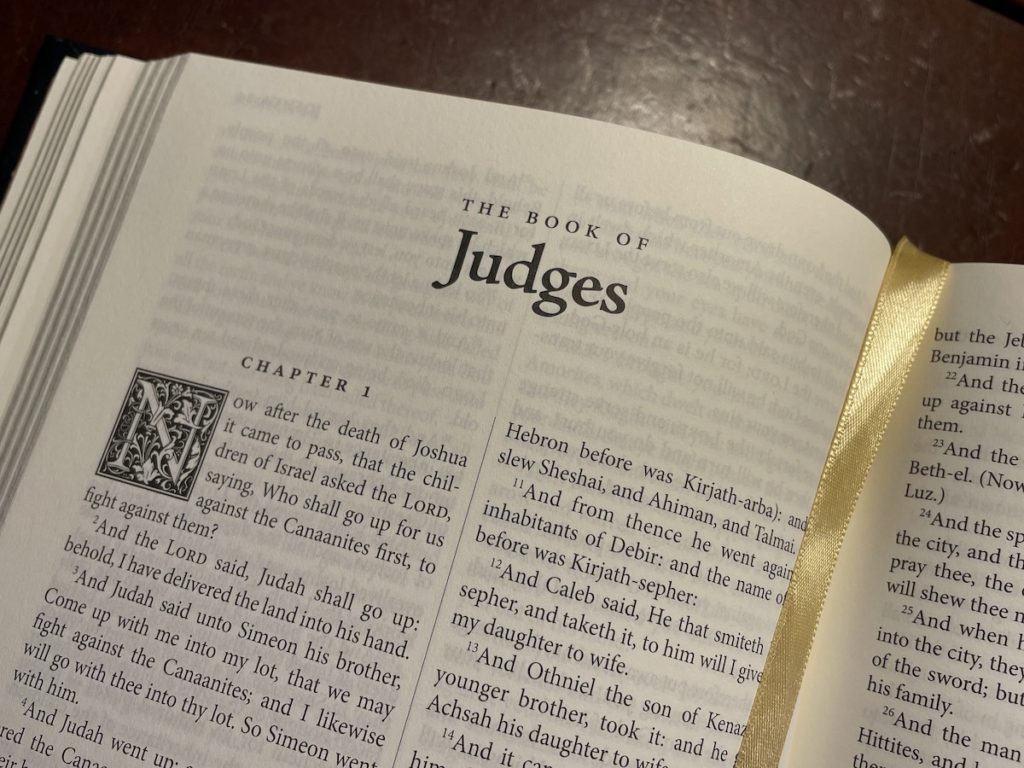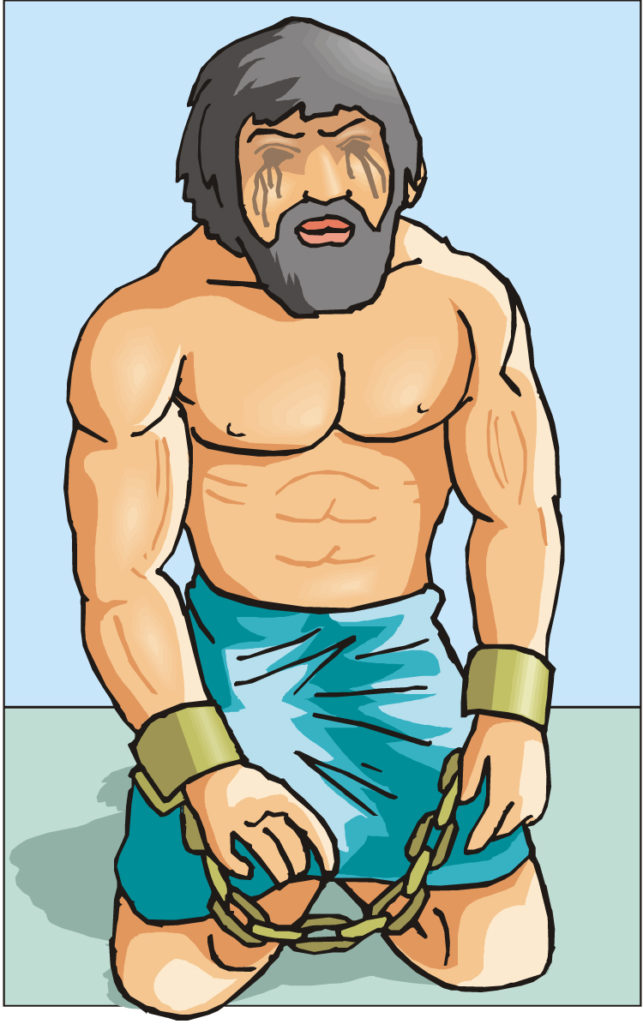
Judges 11
Jephthah—A Man of Faith From “the Other Side of the Tracks”
Judges 11:1–2, Was the son of a harlot. YHVH can raise up anyone to accomplish his purposes—even men of low degree. YHVH does not judge a man by his outward appearances, but by the condition of his heart (1 Sam 16:7). In YHVH’s eyes, what was Jephthah? (See verse 1.) Are there specters from your past that still haunt you and hold you back, or have you overcome them by the blood of the Lamb and assumed your new identity as more than a conqueror who is seated in heavenly places with Yeshua? (Read Phil 4:13; Rom 8:37; Rev 12:11; Col 2:12; Eph 2:6; for your inspiration and edification; also read Zec 4:6 and 1 Cor 1:27.) YHVH can take any vessel, no matter how average it may be, and elevate it for his purposes providing the vessel has faith and willingness to be used. In this way, YHVH and not man gets the glory. Will you be such a vessel in YHVH’s hands?

Judges 11:12, Jephthah sent messengers unto the king. Before going to war with the people of Ammon, Jephthah made every effort to diplomatically resolve Israel’s differences with that hostile nation. Armed conflict was still the result, and YHVH gave Israel the victory.
What can we learn from this? Yeshua instructs us to make every attempt to create peace with our enemies before resorting to legal (or in Jephtha’s case, lethal) means (Matt 5:25–26). When all else fails, if one is walking in the paths of righteousness, know that YHVH will back you when, as a last resort, you come to blows with your enemies.
In Scripture, there exists no prohibition against self defense. Some will use Yeshua’s admonition to turn the other cheek (Matt 5:39) as justification not to defend oneself against an aggressor, and that somehow doing so will be a witness to one’s enemy of the love of Yeshua. Not defending oneself may accomplish this noble goal, but more likely the aggressor will view it as a sign of weakness to justify increased aggression against you and your loved ones.
When Yeshua said to turn the other cheek what did he really mean? Was Yeshua justifying pacifism in place of self defense? According to Hebrew scholars, David Biven and Roy Blizzard, pacifism has never been part of Hebrew thought or culture. It is permissible to kill in order to defend oneself. The authors point out that some of Yeshua’s disciples were armed (Luke 22:38, 50), and that once Yeshua even suggested that his disciples purchase swords (Luke 22:35–37). When instructing his disciples to turn the other cheek, Yeshua was not talking about how to deal with violent aggressors such as rapists, robbers, or murderers, or when facing an enemy in battle. Rather he was talking about the fundamentals of brotherly relationship—how to relate to our neighbors. In other words, if a friend embarrasses us by slapping us in the face, we are not to slap him back, but instead to offer him the other cheek. This has nothing to do with a battlefield situation or when dealing with a violent aggressor. (Understanding the Difficult Words of Jesus, pp. 68–71). In other words, when it comes to offensive words or actions from brother in the faith, we need to let offences simply roll off our back, for love covers a multitude of sin (1 Pet 4:8).
Judges 11:29, Then the Spirit of YHVH came upon Jephthah. There are those who claim that the power and gifts of YHVH’s Spirit were unknown in biblical times prior to the outpouring of the Spirit on the day of Pentecost in Acts chapter two. This is not altogether true when one considers this passage concerning Jephthah. What are some other examples of YHVH’s Spirit coming upon Israelites in the prior to the Pentecost? (See Num 11:26–27; 24:2; Judg 3:10; 6:34; 13:25; 14:6,19; 15:14; 1 Sam 10:11; 11:6; 19:20–24; 1 Chron 12:18; 2 Chron 24:20.)

Judges 11:30–31, For a burnt offering (KJV); or as a burnt offering (NAS, NIV, NKJV); or as an elevation offering (ASET). This doesn’t mean that Jephthah literally made a human sacrifice of his daughter, for this would not only have violated the Torah, but would have been subscribing to the most heinous and vile of heathen practices, that of human sacrifice to their gods. Not only that, the Torah made provisions for one who made a rash and illegal vow. It was considered a sin to so, and atonement could be made for it by making the required sin offering (Lev 5:4–6).
More realistically, Jephthah consecrated his daughter to YHVH for the rest of her life (like a Nazarite) to remain in a virginal state (which is why she bewailed her virginity and Jephthah had no descendants — a terrible price to pay for a rash vow, yet to Jephthah’s credit for keeping his vow to Elohim even to his own hurt —a mark of a righteous man (Ps 15:4; Heb 11:32). Perhaps Yeshua had this incident in mind when he instructed his disciples to not swear an oath at all, but to give one’s word only by saying “yes” and “no” (Matt 5:34–37).
Judges 11:30, Jephthah vowed a vow. Rash words (or vows) spoken may come back to haunt a person. Be careful with the mouth. Proverbs 10:19 says, “In the multitude of words there lacks not sin, but he that refrains his lips is wise.” Not only that, was Jephthah attempting to negotiate with YHVH? If so, was this a wise move? Does YHVH really need or want anything that we could possible give him in order to curry his favor? There is only one thing that he wants from us. What is that? (Read Hos 6:6; 1 Sam 15:22; Mic 6:8; Isa 66:2.) The heart of man is always the issue with YHVH! (See 1 Sam 16:7; 1 Sam 13:14; Acts 13:22.)
Judges 13
The Birth of Samson—A Mighty Man on the Outside, But Weak on the Inside

Ever since the death of Joshua and during the time of the judges the spiritual and moral state of Israel slowly declined until the time of Samson. As The ArtScroll Rubin Edition Joshua/Judges Commentary points out, Samson was a new kind of judge. “Up to this point, Israel’s sins would lead to foreign domination, followed by repentance and the emergence of a judge who would lead the people to defeat and expel the enemy. In this new period, the people’s descent was so serious that they did not merit a complete salvation of the sort that had been achieved by such judges as Deborah and Gideon.” Nevertheless, it was not in YHVH’s overall plan to let Israel’s enemies go completely unchecked so that the sublimation and eventual destruction of Israel would be complete. He used Samson to check the Philistines’ quest to totally subjugate the nation of Israel and to punish the former, while at the same time YHVH extended grace to Israel by relieving them of some pressure from their enemies (p. 195).

Samson judged Israel for twenty years (Judg 15:20), yet due to his moral weakness with women we can assume that he left that ministry in favor of sensual gratification. How many Christian leaders have fallen from positions of great responsibility and trust for the same reason? YHVH obviously knew of this proclivity in Samson, but he allowed Samson to lead Israel anyway. What is the lesson to be learned from this piece of history? Simply this. Often the leaders of a nation are a mirror reflection of the spiritual and moral state of majority of people in that nation. YHVH allows men to become leaders who have major moral failings, yet who will do the work of YHVH in part, but who are not totally committed to righteousness. YHVH hopes that this form of quasi-judgment upon a nation will help to wake the nation up to their precarious state spiritually and to the fact that they may be on the cusp of major divine judgement if they do not repent of their wicked ways. Many righteous people feel that America has been in this position for some time now in light of its recent presidential and congressional leaders whose moral failings have become very evident, if not somewhat socially acceptable. This is because those the majority of their constituents the same or similar low moral and ethical values. Again, the values of the leaders of a nation often mirror those of the people over which they rule.

The story of Samson is full of sadness. It reveals a nation utterly deteriorated and disintegrated, and a man who through self-indulgence weakens and eventually loses his Elohim-given power to deliver his people.
Alas, the time was to come when Scripture would record of him, ‘he knew not that [YHVH] was departed from him (Judg 16:20)’” (Soncino Edition Pentateuch, p. 604).
In the story of Samson, we have chronicled a man’s path from spiritual greatness to the depths of weakness because of a moral failure that he had failed to master. Though raised by righteous parents, one seemingly insignificant sin was the chink in Samson’s spiritual armor that brought this mighty man down. What can we learn from this sad story? (Read 2 Cor 10:3–5; Eph 6:10–18; Col 3:1–10.)
Samson was endowed from time to time with supernatural strength to accomplish great physical feats, yet he lacked the sanctifying grace abiding in him to transform his nature. One’s possessing outer giftedness or charisma is no proof that one is upstanding morally or that one walks in righteousness.
Have you ever met someone who, on the surface, seemed so gifted, so likable and so spiritual, yet once you got to know them their supposed greatness was no more than mere show—a thin veneer? They were mere frauds. One’s moral character defines who a person really is. A book cannot be judged by its cover. Are you two persons or one? Are you on the outside what you are on the inside, or are you, in reality, two different people, which is the biblical definition of a hypocrite (Matt 23:3, 25–28)?
Judges 13:4–5, For the child shall be a Nazarite. Child rearing and discipline begins not after a child is born, but before, as the story of Samson’s parents shows. Prior to his birth, Samson’s parents began to consecrate their lives in preparation for their son’s birth. The piety and wisdom of Samson’s parents is proven by the fact that they begged for divine assistance and instruction. “There is need of much care for the right ordering both of ourselves and our children, that we may be duly separate from the world, and living sacrifices to [YHVH]” (Matthew Henry Commentary). For those of you who have children in your lives, how seriously do you take raising your children? Or, are they, in reality, a necessary inconvenience and you are counting down the days until they are out of your home? What tangible steps are you now taking with regard to the raising of your children to insure that they will be set-apart unto YHVH and will remain so when they are living independently of you?
Judges 13:6, Told her husband. Husbands and wives need to share with each other about their spiritual relationship and experiences they have with YHVH thereby strengthening their spiritual walk. YHVH planned for husbands and wives to synergize together as one spiritual unit, to be a dynamic balance, and to provide mutual accountability. Does your marriage function in this manner? Is your marriage out of balance where either the woman is the spiritual leader and mouthpiece, while the man leads a life of quiet acquiescence in the background, or, on the contrary, where the man rules his kingdom as a tyrant with the wife acting as a subservient second-class citizen quietly bowing to the man’s every wishes?

Judges 13:8–11, Manoah prayed. Manoah sought YHVH for guidance in raising his son, and YHVH answered his prayer by speaking directly to his wife. Manoah believed his wife’s report from the Heavenly Messenger of YHVH even before he saw the proof of it and was willing to obey YHVH’s instructions based solely on his wife’s word. Men, do you listen to your wives?, even if what they tell you is not what you want to hear? Maybe YHVH is speaking to you through them. Manoah was a wise man in this regard—a man of faith. Yeshua commented about such individuals when he said to Thomas, “because you have seen me, you have believed: blessed are they that have not seen, and yet have believed” (John 20:29). Review the “Hall of Faith” found in Hebrews chapter eleven. Are there any individuals listed here who did not manifest “believing before seeing” faith?
Judges 13:20, The Messenger of YHVH ascended in the flame of the altar.How is the pious, humble and reverent character of Manoah and his wife evidenced in this passage? When the Messenger of YHVH (the pre-incarnate Yeshua) ascended in the flame of the altar, what was YHVH showing this righteous couple? (See Pss 4:5; 51:16–19; cp. 34:18; Isa 57:15; 66:2.)


So glad, Natan, you explained the sacrifice of Jephthah. It had always bothered me greatly to think that a man would rather kill his daughter than to break a vow. Your explanation seems very plausible.
Sonja
The angel going up in the flame of the altar has always reminded me of: ” Beam me up Scotty”!
Shalom, John